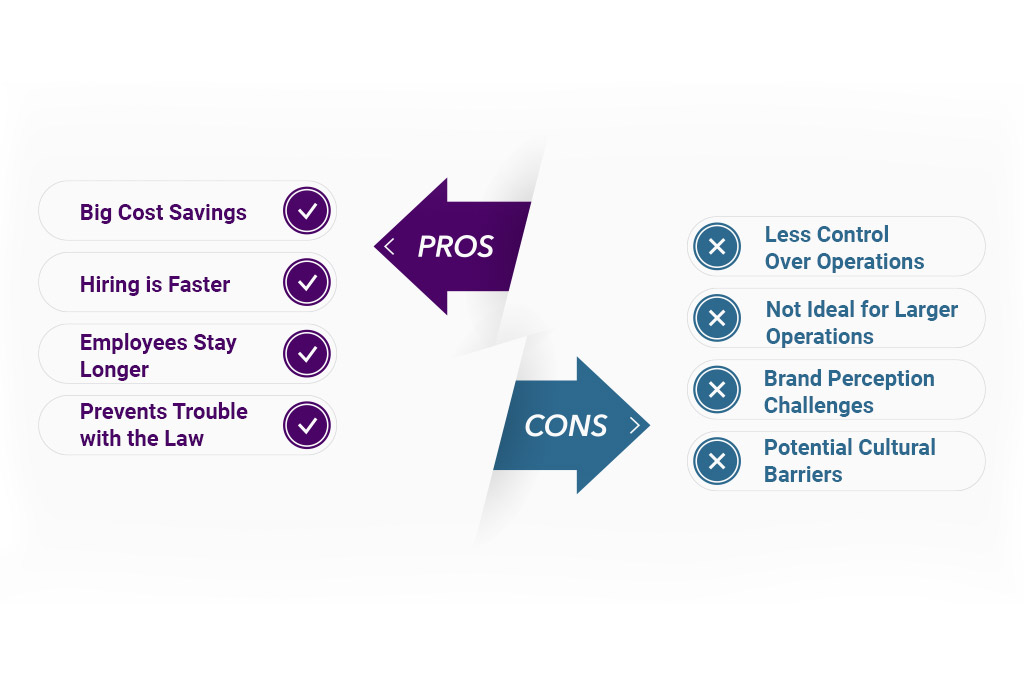Key Takeaways
- Some benefits of EOR include cheaper operations, faster hiring, higher employee retention, and compliance with local labor laws.
- Some risks associated with EOR include less control over operations, compatibility with certain business scales, brand perception challenges, and potential cultural barriers.
- To reduce the risks and reap the benefits of EOR, partner with an EOR that has a proven track record of excellence.
Considering an employer of record (EOR) to expand your workforce? Before venturing into a new territory, you should first explore the reasons why an EOR is a good fit for your firm, or why it may not be. This blog offers a straightforward look at the pros and cons of using an EOR for growing and scaling your accounting firm.
Table of Contents
What is an Employer of Record?

An employer of record, or EOR, is a company that legally employs workers on your behalf. The EOR handles tasks such as payroll, taxes, benefits, and compliance, while the client company focuses on the day-to-day work of the employee.
For instance, if a US-based company wants to hire accountants in the Philippines but doesn’t have a legal entity there, it can use an EOR in the Philippines to legally employ those people.
Employer of Record Benefits

Accounting firms need agility, speed, and compliance when expanding across borders, and that’s where an EOR steps in! An EOR can be your best strategy for global growth, so let’s break down the powerful benefits that make EORs a game-changer for firm owners.
1. Big Cost Savings

With EORs, you don’t need to spend millions on building your own entity, because they are the local legal entity. Partnering with an EOR saves you money because of lower labor expenses, administrative costs, and overall spending on operations.
This reduces your firm’s financial risks, allowing you to allocate your cost savings to other business areas, such as marketing or sales.
2. Hiring is Faster

Imagine working with the best possible talent in a matter of days instead of weeks or months! EORs have a speedy hiring process without sacrificing quality talent.
With the EOR company as the local entity, you automatically have people and systems taking on hiring responsibilities, like onboarding and training.
3. Employees Stay Longer

Aside from skipping the lengthy and costly processes, EOR providers also have high retention rates.
Beyond the mandatory benefits, employee rewards, and workplace perks, staff working in EORs often demonstrate strong loyalty and genuine appreciation for their employers, helping you retain your workers better and cut the costs of hiring employees and training replacements in turn.
With higher employee retention, you also reduce most business continuity risks. This is because longtime employees have already established a rhythm with their tasks and projects, which they also most likely find joy in.
4. Prevents Trouble with the Law

Since EORs are based in your country of choice, they know the ins and outs of local laws on tax regulations, business operations, and employment related matters. EORs are also adept at global compliance requirements.
This mastery of both global and local regulations, as well as the broader business landscape, reduces the possibility of legal disputes.
Employer of Record Risks

The right EOR can transform your firm for the better, but it can come with a maze of challenges, too. Although an EOR can be a good strategy for scaling and cost-cutting, there are also considerable concerns that any firm owner should watch out for.
1. Less Control Over Operations

If you’re a hands-on firm owner who wants as much oversight on your business operations, then partnering with EOR may not be for you. When there’s not much supervision, client data security may be compromised.
For cases like this, work with an EOR that prioritises data sensitivity and cybersecurity.
2. Not Ideal for Larger Operations

You can still scale your firm with an EOR, but if you’re aggressively growing your global workforce, then it might be a better choice to invest in building a local entity in your country of choice, given that you’ve calculated the total costs of your venture.
3. Brand Perception Challenges

It’s important that your clients believe what your service represents. Unfortunately, with EORs, there could be a perceived disconnect between the staff and the parent firm, potentially impacting staff belongingness and loyalty. This can also affect how your clients and prospects can perceive your firm.
4. Potential Cultural Barriers

Since EORs operate in different territories, there may be a cultural gap between the parent firm and the host country. Additionally, there’s potential mistrust of staff, especially if the parent firm isn’t transparent about its business model.

EOR Pros and Cons: Which Outweighs Which?
Ultimately, it boils down to your firm’s needs. If you’re planning on aggressive global expansion, more control over operations, and cultural alignment, then an employer of record may not be the best option for you. However, if you think that the benefits outweigh the disadvantages, then we’ve got these useful workarounds for the associated risks with EOR providers.
Reducing Employer of Record Risks

So, you’ve decided to work with an EOR company. With that said, we recommend learning preventive measures against the associated risks with EOR providers before stepping into this uncharted territory.
Choose the Right Country
Countries like the Philippines are ideal for US-based accounting firms. Aside from being well-known because of their warmth and hospitality, Filipino employees are generally English-proficient, appreciate Western culture, and look up to their superiors as well. This step eliminates the risk of cultural barriers.

Read More: Top Employer of Record (EOR) Countries
Choose a Good Employer of Record Partner
It’s crucial to partner with an EOR that has a proven track record of excellence. If you already have an EOR of choice, check their awards, certifications, or client history. To mitigate the risk of operational control loss, partner with an EOR company that provides you with complete transparency, visibility, and access to daily operations and processes.
An Alternative to EOR: Outsourcing Your Accountants
Still unsure about EOR? We have something better for you: Outsourcing.
Outsourcing provides you with the specific outcomes you want, while your partner company handles staffing, training, and management. A hands-off and results-focused arrangement, outsourcing offers enhanced accessibility and visibility when it comes to your staff.
Curious about outsourcing? Book a chat with us today.























